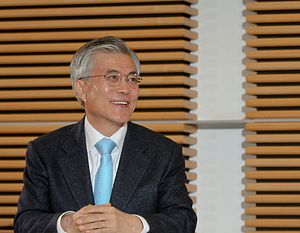June 9 marks one month since South Korea’s presidential election, when the country chose former human rights attorney and liberal leader Moon Jae-In to replace previous, ousted President Park Geun-hye. With this, the nation not only rejected corruption and exhibited democratic power, but swore in South Korea’s first left-leaning president in a decade. While Moon entered the presidency with high expectations from the left and extreme scrutiny from the right, for many, he represents a new era of hope and reconciliation on the Korean Peninsula.
During the campaign, Moon’s platform emphasized and promised chaebol dismantlement, economic development, and further discourse and dialogue with North Korea: all lofty goals with, if unmet, dire consequences for the nation, the peninsula, and the future of Moon’s Democratic Party. Only one month into the presidency, and while facing political challenges of its own, the Moon administration has begun to make ripples in South Korea’s economic and political landscapes by sticking to its promises.
Moon’s stance on security issues is complex due to the involvement of not only North Korea, but both the United States and China. While Moon has aggressively advocated for dialogue with the North, dealing with Pyongyang will require synergy with the two other powers. In addition, moving forward with international diplomacy is semi-contingent on South Korea’s pending nomination of its next foreign minister, UN veteran officer Kang Kyung-wha.
In a sign of the difficult balancing act Moon faces, the South Korean government froze the controversial Terminal High Altitude Defense missile system (THAAD) on June 7, with Moon citing his concerns about the system’s environmental impact.
While THAAD is backed by Washington, as it considers the system crucial to the protection of South Korea and U.S. troops stationed on the peninsula, THAAD has infuriated Beijing and has divided Seoul. The missile system’s deployment and its future will undoubtedly be of great concern when Moon visits U.S. President Donald Trump in Washington later this month. Moon has emphasized South Korea’s independent democracy in regard to THAAD; given the two leaders’ stark differences in stance, some friction will be inevitable.
Further complicating Moon’s security agenda, less than 24 hours after his announcement on THAAD, North Korea launched another test run of missiles. These launches were the fifth demonstration since Moon’s electoral win last May. Analysts reported to the New York Times that Thursday’s launches were “surface-to-ship cruise missiles… meant to demonstrate that the North could repel forces staging a strike on the Korean Peninsula.” That same day, Moon held his first national security meeting in Seoul to discuss the latest tests.
Despite the promising start, Moon also faces challenges in addressing South Korea’s economic challenges; while the issues surrounding chaebol dominance have always been of high priority for Koreans, the ousting of his predecessor gave Moon little choice but to heavily emphasize the need to eliminate corruption. In his inauguration address, Moon asserted that under his administration, “the word meaning cozy relations between political business circles will completely disappear.” President Moon must follow through with his promise of chaebol reform not only to keep the trust of his followers, but in order to address structural issues in the South Korean economy.
Though only a month into his tenure, Moon has taken steps that reflect his platform. Opinion polls have showed the public’s general optimism for this administration; while under incredible pressure to unify a nation torn by corruption and to diplomatically deal with its northern neighbor, Koreans remain hopeful about Moon’s potential and the nation’s future.
Sungmoon Lim is an editorial assistant at The Diplomat.

































